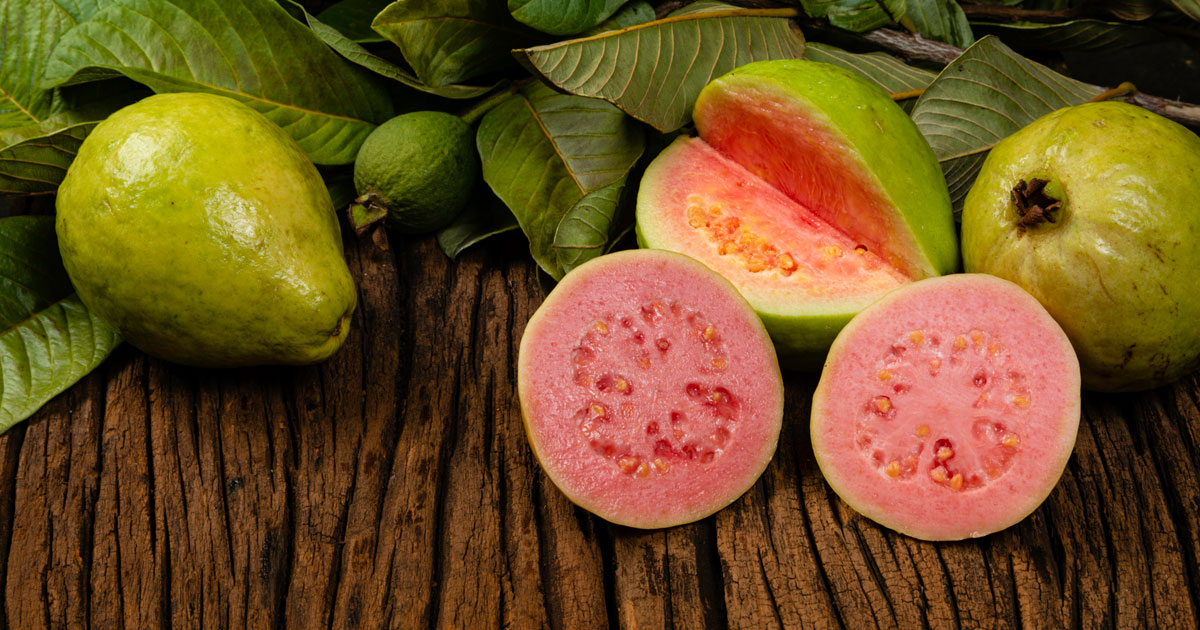
Guava is a tropical fruit that may seem exotic to many Americans, but it has become a staple in many households in recent years. In fact, there is evidence that the use of guava has increased dramatically over the past several years. Part of this increase in popularity is due to its unique flavor, described by many as a cross between a pear and a strawberry. But apart from the sweet, tangy flavor of fresh guava, the fruit is also highly valued for its high nutritional value and associated health benefits.
The guava tree (psidium guajava l) is one of the only members of the Myrtaceae family with a well-known fruit product. The fruit itself has been cultivated for thousands of years over an area that stretches from Mexico and Central America to South America and the Caribbean. Originally grown by the ancient Aztec and Mayan civilizations, European colonists would eventually bring knowledge of the fruit back to Europe, India, and the rest of Asia. Today it is valued in many different cuisines around the world.
The adaptability of guava plants to diverse climates has contributed to their widespread cultivation and popularity in different parts of the world. In general, though, guavas thrive in warm climates with adequate sunlight and well-drained soil. And while the guava plant has been primarily cultivated for the fruit, there is also a long history of the leaves being used in folk medicine contexts. Even today, the leaves are used to make herbal teas, and there is ongoing study into their medicinal properties as well.
Most people eat guava for the tart, aromatic flavor of the juice and flesh, but it is also a healthy fruit loaded with nutrients and compounds that provide a variety of health benefits. In addition to containing an impressive 5.4 grams of dietary fiber, a typical serving of guava has significant amounts of minerals like potassium and calcium and vitamins like vitamin A and vitamin B9 (folic acid). Most notably, however, guavas contain more than double the recommended daily amount of vitamin C.
Another aspect of guavas that make them such a great part of a healthy diet is their antioxidant properties. Antioxidants are compounds that inhibit oxidation, a type of biochemical reaction that produces subatomic particles called free radicals that are thought to be a major factor in the development of various diseases. In guava there are numerous phytochemicals that contain antioxidants; examples include polyphenols like quercetin (a flavonoid) or carotenoids like lycopene. This diverse array of nutrients and plant compounds can lead to a number of potential health benefits:
While guava is often eaten raw, it is a versatile fruit that can be used in a wide variety of culinary applications. Most of the crop grown worldwide each year is sold fresh, but about 15% is used in commercial food manufacturing settings like at FruitSmart. After going through the processes of sorting and washing, there are many ways the fruit ingredients can be used:
Guava may seem unfamiliar and exotic to many people, but it has been a staple of many cultures for centuries because of its great flavor and extensive health benefits. At FruitSmart, we are proud to offer the highest quality fruit ingredients in the form of juices, concentrates, essences, and purees. If you’d like to learn more about our products or how we can help you develop great new products for your customers, please contact us today.
